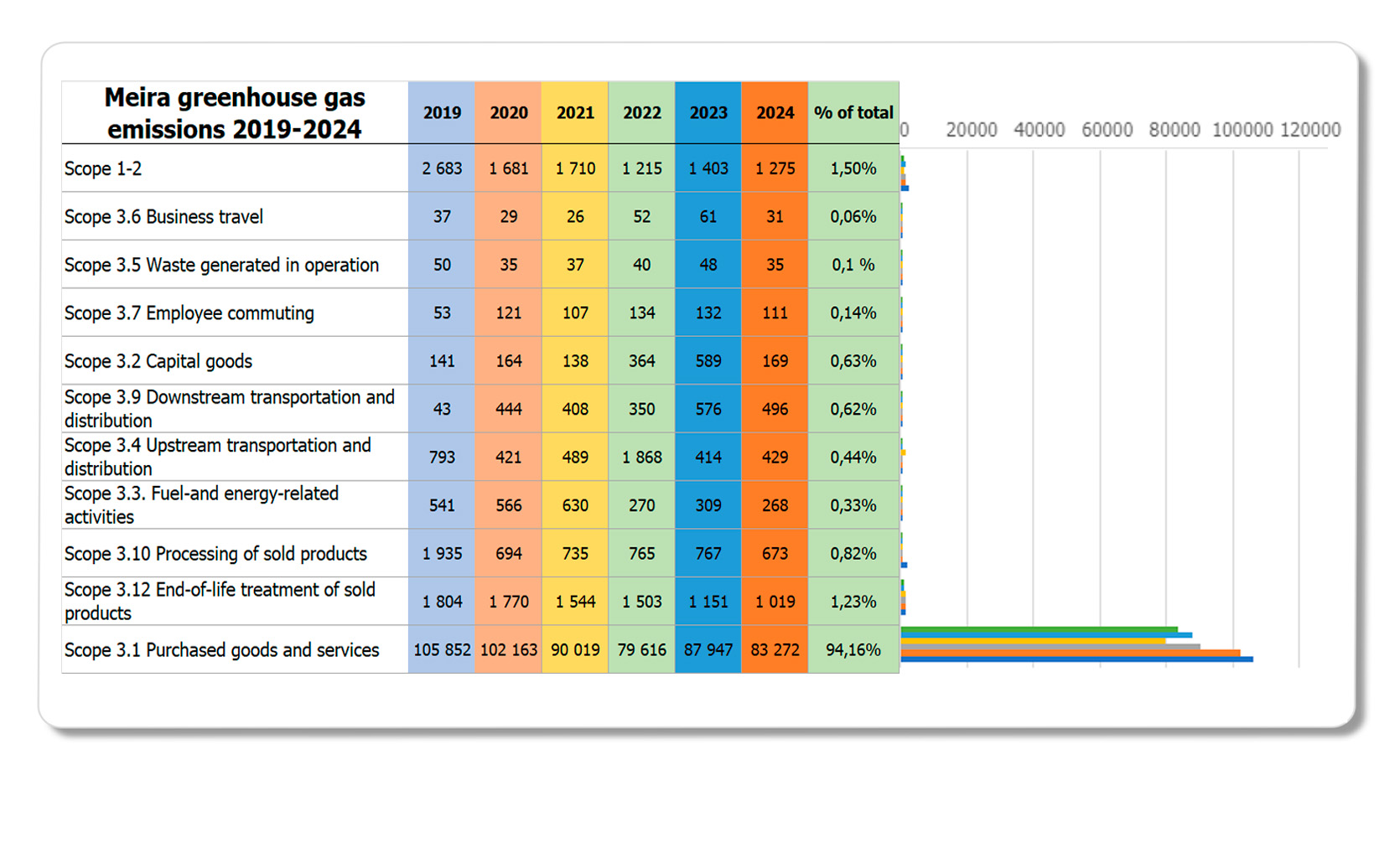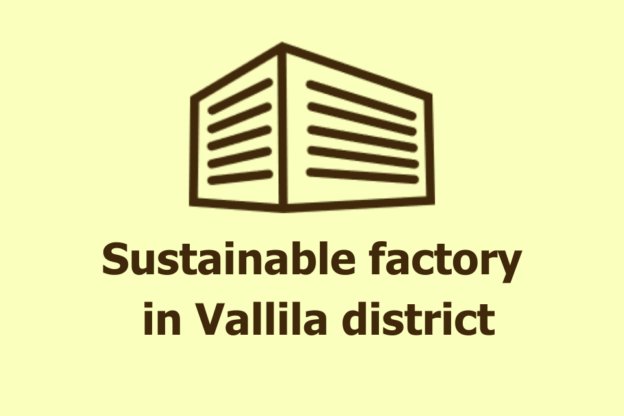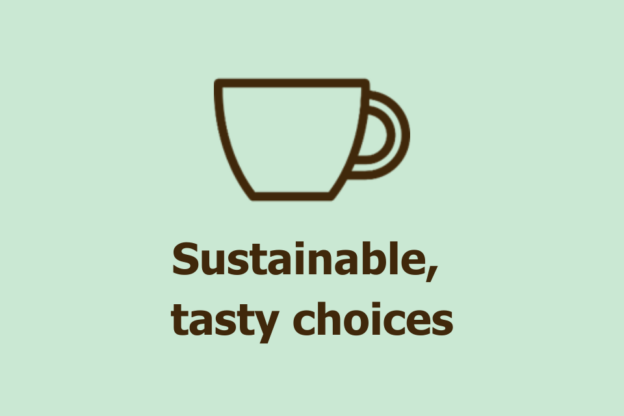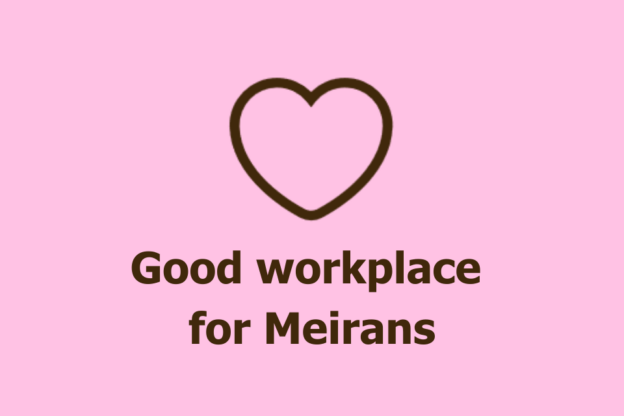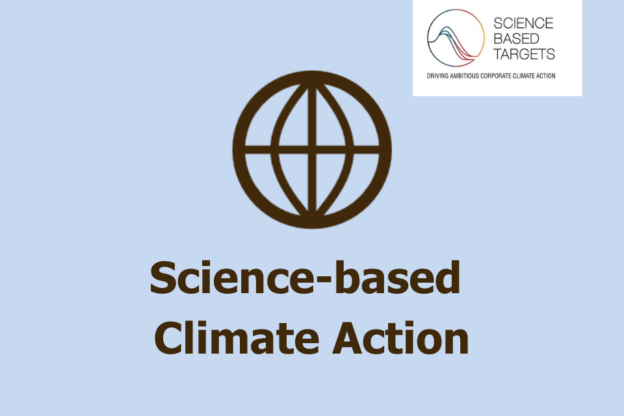Food production and the food industry play an important role in the work against climate change. At Meira, we are among the top Finnish companies committed to this work and already in 2022 we have joined the growing international group of companies that have approved their emission reduction targets by the Science Based Targets Initiative’s impartial expert panel. Climate work is a key part of our responsibility work based on the UN Sustainable Development Goals.
The emission reduction goals for Meira’s own operations (scope 1 and 2) are in line with the goal of the Paris climate agreement. Meira is committed to reducing the absolute scope 1 and 2 emissions resulting from its own operations by 80 percent by 2028 compared to 2019 emissions.
In Meira’s own operations, climate work boils down to improving energy efficiency and increasing renewable energy. This work has been ongoing for years. We systematically reduce the energy demand of Meira’s operations, we use origin-verified, minimum emission-free or renewable electricity, and we have a roadmap for replacing natural gas with biogas and transitioning to renewable district heating. These decisions are in line with our promise “Fairly, For Far Better Moments”.
Part of the climate work required by SBTi is to also calculate the emissions of the value chain outside of own production (so-called scope 3) in accordance with the GHG protocol and set a target for the climate work also in relation to these emissions. The GHG protocol is the most well-known global standard for carbon footprint calculation.
In industrial production, it is very typical that the majority of emissions are generated in the value chain outside of one’s own direct operations. The largest single source of emissions in Meira’s operations is the cultivation of coffee and spices, where climate impacts arise from, for example, the production and use of fertilizers. That’s why we have an active discussion with our partners operating in the countries of origin. We encourage them to find out their own climate impacts and to take development measures to reduce these impacts. We commit our largest suppliers to model their own greenhouse emissions and set science-based emission reduction targets in accordance with the Paris Climate Agreement. The countries of origin of coffee and training and encouraging farmers in climate-friendly farming methods play a particularly important role. To further indicate this work, in 2025 we will also set and validate the FLAG (Forest, Land & Agriculture) target for the land use sector as part of our SBT package. For the first time, the FLAG targets makes the emissions of the Forest, Land & Agriculture sector visible in the GHG calculation and points the way for the work that reduces emissions in our value chain.
Meira Oy’s science-based targets:
- Meira Oy commits to reduce absolute scopes 1 and 2 GHG emissions 80 % by 2028 from a 2019 base year*.
- Meira Oy commits to reduce absolute scope 3 GHG emissions from upstream transportation and distribution and waste generated in operations 50 % over the same time frame.
- Meira Oy commits that 90 % of its suppliers by emissions covering purchased goods and services will have science-based targets by 2025.
*The target boundary includes land-related emissions and removals from bioenergy feedstocks.
Greenhouse gas (GHG) emission development 2019-2024
- Meira’s total emissions in 2024 were 87,778 tCO₂e (covering the entire value chain, i.e. scopes 1–3), representing a 23% decrease compared to 2019 and a 6% decrease compared to the previous year, 2023.
- Emissions from Meira’s own operations (direct and indirect, i.e. scopes 1–2) decreased by 52% compared to 2019 and 9% compared to 2023. The total emissions from Meira’s own operations in 2024 were 1,275 tCO₂e.
- The reduction in scope 1–2 emissions is due to the transition to zero-emission electricity, renewable energy (bio gas) and energy efficiency measures:
- The share of natural gas (scope 1) decreased, while the share of biogas increased.
- Emissions from leased vehicles decreased by approximately 8.5 tCO₂e.
- In scope 2, both electricity and district heating consumption declined slightly.
- Note: In the 2024 calculation, 94 MWh of electricity fell outside the scope of origin guarantees.
- Scope 3 emissions decreased from 2023 due to refined calculations in 2024 and actions or changes across several categories:
- Scope 3 categories show variation due to volume changes and updated emission factors.
- Emission calculations for coffee and spices were refined, emission factors updated, and FLAG-related emissions were excluded due to FLAG accounting.
- Scope 3.2 (CAPEX purchases) decreased significantly.
- In scope 3.4 (transport), some shipments transitioned to renewable fuels in early 2024.
- Scope 3.6 (business travel) declined significantly in 2024.
On this page, we report annually on the development of greenhouse gas emissions in our value chain.

